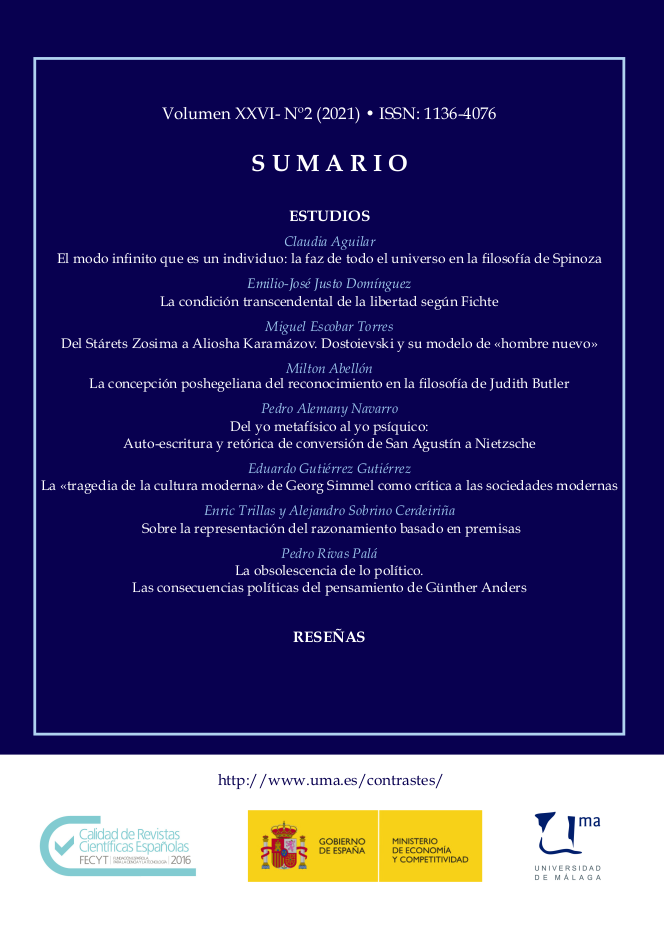The transcendental condition of freedom according to Fichte
DOI:
https://doi.org/10.24310/Contrastescontrastes.v26i2.9846Keywords:
Absolute, freedom, idealism, intersubjectivity, self.Abstract
Fichte’s thought assumes the fact of freedom and through the analysis of the self offers a transcendental foundation for this affirmation. In this way, it contributes to elaborate a concept of freedom that allows us to think the conscience of human being, his relationship with others and his political organization. This article presents the fundamental lines of the Fichte’s philosophy that refer to the transcendental condition of freedom and its relationship with the absolute. In addition, it tries to show the potential of the idealism to think the reality from freedom.
Downloads
Metrics
Publication Facts
Reviewer profiles N/A
Author statements
Indexed in
-
—
- Academic society
- N/A
- Publisher
- Universidad de Málaga
References
ÁLVAREZ GÓMEZ, M., Pensamiento del ser y espera de Dios, Salamanca: Sígueme, 2004.
BAUMANNS, P., J. G. Fichte. Kritische Gesamtdarstellung seiner Philosophie, Freiburg-München: Alber, 1990.
BAUMGARTNER, H. M., “Die Bestimmung des Absoluten. Ein Strukturvergleich der Reflexionsformen bei J. G. Fichte und Plotin”, Zeitschrift für philosophische Forschung, 34 (1980), pp. 321-342.
BRITO, E., J. G. Fichte et la transformation du christianisme, Leuven-Paris-Dudley: Leuven University Press-Peeters, 2004.
BRITO, E., J. G. La théologie de Fichte, Paris: Cerf, 2007.
COLOMER, E., El pensamiento alemán de Kant a Heidegger 2. El idealismo: Fichte, Schelling y Hegel, Barcelona: Herder, 1995.
CRUZ CRUZ, J., Fichte. La subjetividad como manifestación del absoluto, Pamplona: EUNSA, 2003.
FICHTE, J. G., Anweisung zum seligen Leben (1806), en I. H. FICHTE (Hg.), Fichtes Werke V, Berlin: Walter de Gruyter, 1971, pp. 397-580.
FICHTE, J. G., Darstellung der Wissenschaftslehre (1801), en I. H. FICHTE (Hg.), Fichtes Werke II, pp. 1-163.
FICHTE, J. G., Die Bestimmung des Menschen (1800), en I. H. FICHTE (Hg.), Fichtes Werke II, pp. 165-319.
FICHTE, J. G., Die Staatslehre (1813), en I. H. FICHTE (Hg.), Fichtes Werke IV, pp. 367-600.
FICHTE, J. G., Die Wissenschaftslehre (1804), en I. H. FICHTE (Hg.), Fichtes Werke X, pp. 87-314.
FICHTE, J. G., Die Wissenschaftslehre (1812), en I. H. FICHTE (Hg.), Fichtes Werke X, pp. 315-492.
FICHTE, J. G., Erste Einleitung in die Wissenschaftlslehre (1797), en I. H. FICHTE (Hg.), Fichtes Werke I, pp. 417-449.
FICHTE, J. G., Grundlage der gesammten Wissenschaftslehre (1794), en I. H. FICHTE (Hg.), Fichtes Werke I, pp. 83-328.
FICHTE, J. G., Grundlage der Naturrechts nach Principien der Wissenschaftslehre (1976), en I. H. FICHTE (Hg.), Fichtes Werke III, pp. 1-385.
FICHTE, J. G., Über den Grund unseres Glaubens an eine göttliche Weltregierung, en I. H. FICHTE (Hg.), Fichtes Werke V, pp. 175-189.
FICHTE, J. G., Versuch einer neuen Darstellung der Wissenschaftslehre (1797), en I. H. FICHTE (Hg.), Fichtes Werke I, pp. 519-534.
FICHTE, J. G., Zweite Einleitung in die Wissenschaftslehre (1797), en I. H. FICHTE (Hg.), Fichtes Werke I, pp. 451-518.
JANKE, W., Fichte. Sein und Reflexion – Grundlagen der kritischen Vernunft, Berlin: Walter de Gruyter, 1970.
LAUTEMANN, W., “Transzendentalphilosophie als Anthrolopolgie und als Erscheinungslehre. Ein Panorama neuerer Fichte-Interpretationen”, Philosophische Rundschau, 23 (1976), pp. 197-256.
MANZANA, J., “El ascenso y la ‘determinación’ del Absoluto-Dios, según Joh. Gottl. Fichte, en la primera parte de la exposición de la ‘Teoría de la Ciencia’ de 1804”, Scriptorium victoriense, 9 (1962), pp. 9-68. 181-244.
MANZANA, J., Lo absoluto necesario en la historia, Madrid: Fundación Emmanuel Mounier, 2003.
MAYER, A., Freiheit als Prinzip des Bewu?tseins. Vergleichende Untersuchung zur einheitsstiftenden Funktion des Freheitsbegriffs in den Schriften J. G. Fichtes, Frankfurt am Main-Bern-New York-Paris: Peter Lang, 1990.
PANNENBERG, W., “Fichte und die Metaphysik des Unendlichen”, Zeitschrift für philosophische Forschung, 46 (1992), pp. 348-362.
PAREYSON, L, Fichte. Il sistema della libertà, Milano: Mursia, 1976.
PHILONENKO, A, Liberté dans la philosophie de Fichte, Paris: Vrin, 1966.
RIOBÓ GONZÁLEZ, M., Fichte, filósofo de la intersubjetividad, Barcelona: Herder, 1988.
SCHULZ, W., Johann Gottlieb Fichte. Vernunft und Freiheit, Pfulligen: Neske, 1962.
STOLZENBERG, J., “Fichte heute”, en W. BEIERWALTES – E. FUCHS (Hgg.), Symposion Johann Gottlieb Fichte. Herkunft und Austrahlung seines Denkens, München: Bayerische Akademie der Wissenschaften-Beck, 2009, pp. 85-96.
TILLIETTE, X., Fichte. La science de la liberté, Paris: Vrin, 2003.
TILLIETTE, X., La christologie idéaliste, Paris: Desclée, 1986.
TURRÓ, S., “Estudio preliminar”, en J. G. FICHTE, Lecciones de filosofía aplicada. Doctrina del Estado, Salamanca: Sígueme, 2017, pp. 9-56.
TURRÓ, S., Fichte: de la consciencia al absoluto, Bogotá: Aula de Humanidades-Unisalle, 2019.
VERWEYEN, H., “Fichtes Religionsphilosophie. Versuch eines Gesamtüberblicks”, en K. HAMMACHER – R.
SCHOTTKY – W. H. SCHRADER (Hgg.), Fichte-Studien. Beiträge zur Geschichte und Systematik der Transzendentalphilosophie 8: Religionsphilosophie, Amsterdam-Atlanta: Brill, 1995, pp. 193-224.
ZÖLLER, G., Leer a Fichte, Barcelona: Herder, 2015.
Downloads
Published
How to Cite
Issue
Section
License
This journal provides immediate free access to its content under the principle of making research freely available to the public. All content published in Contrastes. Revista Internacional de Filosofía, are subject to the Creative Commons Attribution-NonCommercial-ShareAlike 4.0 license whose full text can be found at <http://creativecommons.org/licenses/by-nc-sa/4.0>
It is the responsibility of the authors to obtain the necessary permissions of the images that are subject to copyright.
Authors whose contributions are accepted for publication in this journal will retain the non-exclusive right to use their contributions for academic, research and educational purposes, including self-archiving or repository in open access repositories of any kind.
The electronic edition of this magazine is edited by the Editorial Service of the University of Malaga (Uma Editorial), being necessary to cite the origin in any partial or total reproduction.










5.png)
